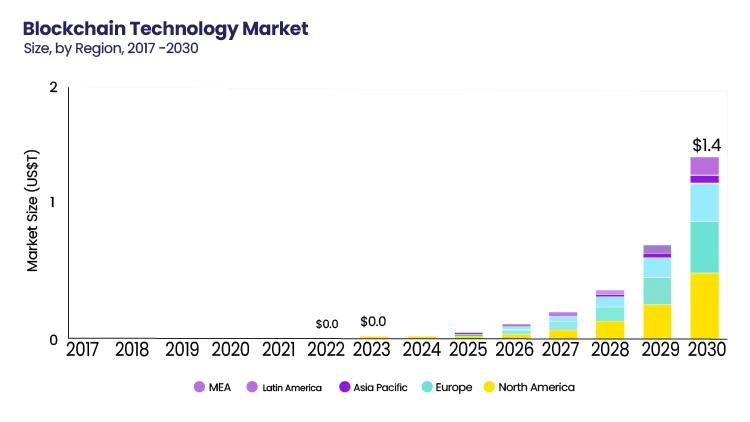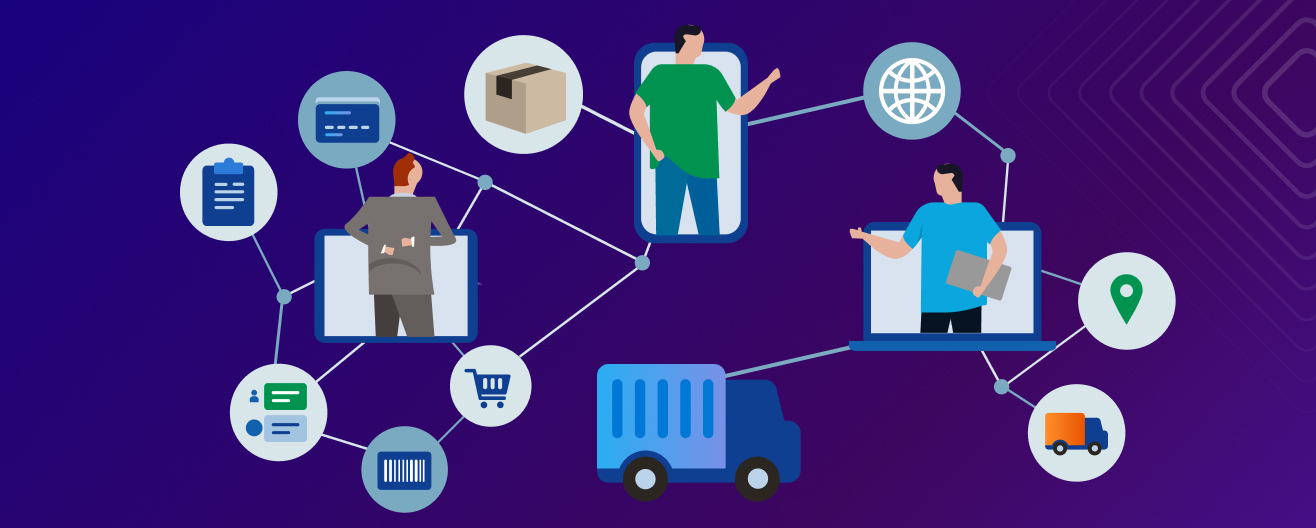
In 2025, Blockchain Business Solutions will transform the way organizations tackle long-standing challenges. No longer just about cryptocurrency, blockchain has evolved into a powerful technology for addressing real-world business challenges.
From data security and transparency to improved collaboration, blockchain is now a trusted ally in overcoming critical enterprise hurdles.Many organizations are already investing in blockchain development services to build secure and scalable solutions.
Companies are increasingly adopting blockchain to address enterprise problems such as fraud, data breaches, supply chain inefficiencies, and lack of trust in digital transactions.
With its decentralized and tamper-proof nature, blockchain offers a secure and transparent environment for data sharing and process automation.
This blog examines the key benefits of blockchain for businesses, including how blockchain can help businesses in 2025 by reducing costs, enhancing trust, and improving efficiency.
You will also discover blockchain use cases for companies, real-world applications, and insights into what blockchain can solve in business today. Whether you are a startup or an established firm, it’s time to explore why businesses should use blockchain as a foundation for future growth.
Blockchain technology is growing rapidly worldwide, driven by strong investments, cloud adoption, and regional leadership in North America and Europe.

Blockchain is a digital ledger system that securely records transactions across a network of computers without the need for a central authority. Instead of storing data in one place, blockchain distributes it across multiple computers, making it nearly impossible to tamper with or hack.
Every transaction added to the blockchain is verified, time-stamped, and permanently stored, creating a transparent and trustworthy system.
In the context of Blockchain Business Solutions 2025, this technology is becoming essential for solving critical business problems. Whether it’s data security and transparency, reducing fraud, or improving supply chain tracking, blockchain provides a reliable foundation.
So, how does this help companies? With blockchain, businesses can automate trust, eliminate third-party costs, and ensure every transaction is visible and verifiable. This makes it a powerful tool for improving operations, reducing risk, and building customer confidence; key reasons why businesses should use blockchain in 2025.
In 2025, blockchain will become a key part of digital transformation for many companies. From startups to large enterprises, businesses are using blockchain to improve operations, cut costs, and build trust in ways that traditional systems can’t.
With an increased focus on data security and transparency, blockchain provides a reliable solution that solves both technical and operational challenges. This decentralized technology allows companies to automate processes using smart contracts, reduce fraud through secure record-keeping, and gain real-time insights through transparent data sharing.
As industries continue to digitize, the top benefits of blockchain for businesses in 2025 revolve around its ability to offer speed, security, and verifiability across all operations.
Let’s explore how blockchain helps businesses in 2025:
Blockchain drives business growth by enhancing transparency, improving security, reducing costs, and enabling faster, trust-based transactions across industries.
In short, blockchain is not just a future tech; it’s a practical solution to blockchain technology for enterprise problems, already being used in sectors such as finance, healthcare, logistics, and retail.
Data breaches are increasing in frequency and cost. As businesses manage growing volumes of sensitive information, blockchain offers a secure, decentralized approach to protecting data and maintaining customer trust.
The Problem
In 2025, businesses manage massive volumes of sensitive data ranging from customer details and payment information to confidential contracts and intellectual property. These are often stored in centralized systems, which are vulnerable to cyberattacks.
A single breach can expose entire databases, leading to financial losses, compliance violations, and long-term damage to brand trust. For industries such as finance, healthcare, and e-commerce, this remains one of the most serious blockchain technologies for enterprise problems.
How Blockchain Helps
Blockchain redefines data protection by using a decentralized, encrypted, and transparent approach. It eliminates the single point of failure and ensures only authorized access to critical information.
These following are the major benefits of Blockchain for data security:
With these capabilities, blockchain delivers unmatched data security and transparency, reducing risks while helping companies comply with strict privacy regulations.
This is one of the most powerful blockchain business solutions 2025 has to offer, directly addressing how blockchain helps businesses in 2025 protect their digital assets.
A major challenge for businesses is the lack of transparency and trust among stakeholders, leading to inefficiencies, disputes, and fraud issues that blockchain can effectively address with immutable and shared records.
The Problem
In today’s interconnected business world, customers, partners, and even regulators expect more visibility into how companies operate. Unfortunately, traditional systems often fall short of energy. Many businesses rely on the siloed authenticity of transactions, product origins, or contract details.
It leads to a lack of trust, frequent disputes, hidden costs, and growing concerns over fraud and manipulation. In sectors such as retail, manufacturing, and logistics, transparency has become a major competitive advantage and a major challenge.
How Blockchain Helps
Blockchain offers a powerful solution by making business processes visible, verifiable, and tamper-proof. With its distributed ledger, every action, whether it’s a financial transaction, supply chain update, or contract execution, is recorded in a secure, chronological, and permanent way.
These entries can be accessed and validated by authorized stakeholders in real time. This level of transparency builds confidence not only among customers but also among suppliers, investors, and regulators.
Instead of relying on trust alone, parties can independently verify the truth. It reduces the need for frequent audits and manual reconciliations, improving operational efficiency while enhancing credibility.
These following are the major benefits of blockchain transparency and trust:
This is exactly how blockchain helps businesses in 2025 restore trust, eliminate opacity, and offer real-time accountability in day-to-day operations.
Traditional business transactions are often slow and expensive due to intermediaries, banking delays, and processing fees. Blockchain can streamline processes, reduce costs, and enable near-instant, peer-to-peer transactions.
The Problem
One of the major business problems solved by blockchain is the inefficiency of traditional transactions. Whether it’s sending international payments or executing business contracts, companies often deal with delays, high processing fees, and unnecessary intermediaries. Cross-border payments can take days to settle due to involvement from multiple banks and verifiers.
These delays impact cash flow, slow down operations, and increase overheads, especially for small and medium-sized enterprises (SMEs) trying to scale in a competitive global market.
How Blockchain Helps
Blockchain technology streamlines transactions by cutting out the middlemen. With decentralized networks and smart contracts, businesses can automate payment execution and contract fulfillment. These contracts are coded to trigger actions automatically when conditions are met; no third-party involvement is required.
Blockchain’s real-time processing capability means payments happen in seconds, not days. This significantly reduces transaction fees, settlement times, and manual paperwork. By increasing speed and lowering costs, blockchain supports faster, leaner, and more efficient operations is the key advantage in Blockchain Business Solutions 2025.
These are the following major benefits of blockchain for Transactions:
This is a clear example of how blockchain improves business operations, offering both speed and savings that are essential for growth in a fast-paced digital economy.
Many businesses face delays, errors, and a lack of visibility in their supply chains. Blockchain improves traceability, automates processes, and ensures real-time data sharing among all parties involved.
The Problem
Modern supply chains are global, complex, and fragmented. From sourcing raw materials to delivering finished goods, businesses face challenges such as shipment delays, inventory mismatches, counterfeit products, theft, and poor communication between suppliers and vendors.
These inefficiencies increase operational costs and reduce customer satisfaction. In many industries, especially manufacturing, retail, and food, the lack of end-to-end visibility leads to wasted resources and weak accountability.
How Blockchain Helps:
Blockchain offers an effective solution to these inefficiencies by providing real-time tracking and verification at every step of the supply chain. Each transaction or movement, whether packing, shipping, or storage, is recorded on a secure, shared ledger. This data is accessible to all authorized parties, ensuring that everyone sees the same accurate and tamper-proof information.
By using blockchain, businesses gain full visibility into where a product is, who handled it, and when. This improves coordination, reduces fraud, and allows for faster responses to issues like bottlenecks or delivery disputes. These benefits demonstrate exactly how blockchain will help businesses in 2025 streamline operations and enhance trust.
Here are the following key benefits of blockchain in supply chains
This is a core example of blockchain technology for enterprise problems, helping companies eliminate inefficiencies and boost supply chain performance.
Meeting regulatory requirements and maintaining accurate audit trails can be time-consuming and error-prone. Blockchain ensures real-time, tamper-proof records, simplifying compliance processes and enabling faster, more reliable audits.
The Problem:
Regulatory compliance is a critical, yet complex and costly part of doing business. Whether it is financial reporting, tax filing, data privacy laws, or industry-specific standards, companies must maintain extensive documentation to prove they meet requirements.
Traditional systems rely heavily on manual processes, paperwork, and siloed databases, all of which are prone to human error, fraud, or accidental data loss. During audits, this can lead to delays, disputes, and financial penalties. For many enterprises, compliance has become one of the most resource-draining enterprise problems.
How Blockchain Helps:
Blockchain provides an automated, verifiable, and tamper-proof method for handling compliance data. Each transaction, update, or approval is recorded on a decentralized ledger that cannot be altered retroactively. Because these records are time-stamped and shared across all relevant parties, businesses, and regulators can access trustworthy data at any point without having to sift through endless spreadsheets, files, or emails.
This level of transparency and security transforms how compliance is managed, offering a more efficient and cost-effective way to stay in line with evolving regulations. It’s a clear case of how blockchain improves business operations and a key reason why businesses should use blockchain in 2025.
Here are the following major benefits of Blockchain for compliance:
This is a standout blockchain business solution in 2025, especially for enterprises burdened by traditional compliance systems.
Businesses often struggle with protecting original content and digital assets from theft and fraud. Blockchain secures ownership rights through immutable records, ensuring transparent, verifiable proof of creation and ownership.
The Problem:
Digital content creators, musicians, and software companies often face massive losses due to piracy, unauthorized use, and fake copies of their work. Traditional systems offer limited ways to track ownership, and enforcing rights across borders is complicated and expensive. This is a growing concern that blockchain technology is being used to solve enterprise problems.
How Blockchain Helps:
Blockchain technology secures intellectual property by recording ownership rights, usage terms, and licensing agreements on an unchangeable digital ledger. Each creative asset, whether it’s a song, code, design, or article, is timestamped and tied to its original owner.
These records are transparent and cannot be altered, making it easier to prove authorship and enforce rights. Smart contracts can also automate royalty distribution, ensuring that artists, developers, and content creators are paid fairly whenever their work is used. This eliminates reliance on third parties and minimizes revenue leakage.
These are the following key benefits of blockchain for IP protection:
This showcases how blockchain improves business operations for creators and tech firms, offering a secure and fair model for managing digital assets.
Verifying user identities and validating contracts manually is slow and vulnerable to fraud. Blockchain enables secure digital identities and self-executing smart contracts, reducing risk and increasing operational efficiency.
The Problem:
Verifying customer identities and signing legal agreements is a time-consuming and error-prone process for many businesses. Whether it’s during onboarding, KYC (Know Your Customer), or contract execution, companies often face identity fraud, forged documents, or delays due to manual checks. It not only increases compliance costs but also exposes businesses to legal and financial risks.
How Blockchain Helps:
Blockchain introduces secure, decentralized digital identities that are encrypted, tamper-proof, and easy to verify. These identities can be stored on a blockchain and shared across platforms, reducing the need for repetitive document submissions and manual verification. For contracts, blockchain uses smart contracts, self-executing digital agreements that automatically trigger once predefined conditions are met.
It eliminates the need for intermediaries, reduces processing time, and ensures accuracy. It also protects against unauthorized changes, making contracts far more reliable. These are some of the key blockchain business solutions 2025 has made mainstream, especially in sectors such as finance, healthcare, legal, and HR.
These are the following key benefits of blockchain for identity and contract verification:
These benefits show exactly why businesses should use blockchain and represent strong blockchain use cases for companies handling sensitive customer and contract data.
If you are wondering why businesses should use blockchain, here are some quick, compelling reasons:
As we move further into a digital-first world, Blockchain Business Solutions 2025 offers clear, proven answers to the most pressing challenges companies face.
From data privacy to global transactions and customer trust, blockchain is becoming essential. Companies that adopt it early will gain a competitive edge, cutting costs, building trust, and streamlining operations.
If you are still asking how blockchain helps businesses in 2025, the answer is simple: it’s not just about technology; it’s about solving real problems, reliably and efficiently.
Technical Content Writer
Kavita has a strong background in technology and writes about cybersecurity, software development, and digital marketing. She makes complex topics simple and easy to understand. Her content helps businesses, developers, and marketers learn about cybersecurity threats, best practices, software development, and digital strategies to stay informed and succeed online.



